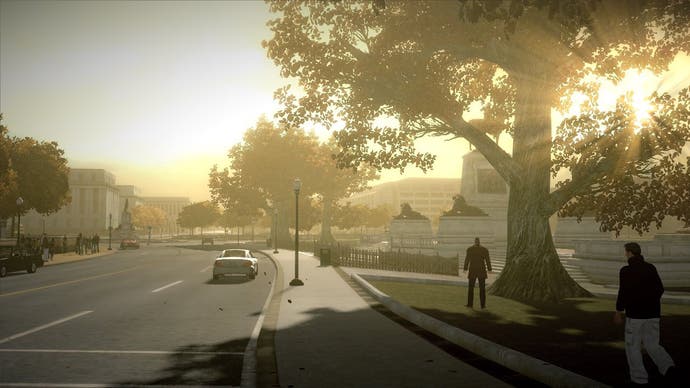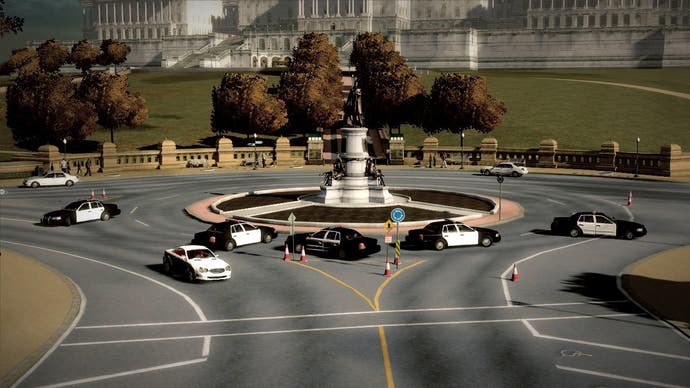Frontier's David Braben
Welcome, Commander Braben.
From space exploration in Elite to sniffing around the bins in Dog's Life, David Braben's games have showcased a surprising range of different experiences. With his Cambridge studio Frontier Developments currently embracing politics with the ambitious thriller The Outsider, while also working on a sequel to last year's LostWinds (as well as gearing up for a return to space sometime in the near future), we caught up with the veteran designer at the Develop Conference in Brighton to discuss the industry's history, the struggles ahead, and why he doesn't want to end up doing the noses on footballers.
They're all very exciting, but I'm afraid we can't say anything about them yet. The problem with all of these things is that giving little snippets of these kind of games just doesn't help: we have to show them properly each time. This is the trouble with things that are close to your heart like this, because you really want to talk about them, but you have to wait to do it in a sensible, managed way.
We're still at the beginning of gaming in my view - we've barely scratched the surface. But as Churchill said, "We may well be at the end of the beginning." A sense of history is something that might be changing for the industry - at least in the sense that it's starting to have a history. Certainly 10 or 20 years ago, most of the things that were in the National Videogames Archive were still in use. There were still PDPs in use, the wonderful machines that Spacewar was first played on.
One of the things I think about at events like the Develop Conference is, compared to other industries like the film industry, we're an astonishingly sociable bunch. People talk openly to each other, when these are companies that, in the film industry, would be deadly rivals. It would be daggers drawn to even be in the same room. There's such a huge positivity, and that's maybe because we're such a young industry. Maybe we haven't learnt to hate each other yet.

[Laughs.] I hope not. I really hope not.
To be honest, we still haven't scratched the surface of what I want to do in games: even ideas I had back then when we were making games like Elite, we still haven't been able to do. The word "game" is a bit of an albatross: what we're really talking about is building worlds, fantasy - you can create things that just aren't possible to do in any other way.
One of the things that Dave Jones said in his keynote was, "You can be a star in your own world." What I like, especially when there's a real richness to a world, to the story and the place, is where you can feel like you're the centre of things. That's very liberating. To show that there's a desire for it out there, look at the number of people who watch soap operas, which are fundamentally non-interactive, but people still want this sense of vicariously being a part of another world. I generally don't watch soap operas, but I occasionally get sucked into them - and they can be very compelling. We haven't yet got that feeling in games: but it will come.
In games, most interaction involves killing, unfortunately. But that's a very simple interaction to do in a way where it feels quite realistic, for better or worse. At the moment, interactions with characters feel very unfulfilling. Whether it's real characters across a computer network, or artificial characters in a game: these are not very fulfilling relationships. It's really very little of interest: it's either stealing stuff from them, killing them and then stealing stuff, or having a bit of voice chat, if you're lucky. At a fierce rate it's getting better, as things like WOW are starting to show, things which are starting to get a different feel about them, but we're still at the beginning.
We shouldn't kid ourselves about the depths of the relationships that are available - other than the purely chat room stuff where the relationship isn't really in the game. Where it gets interesting is when you can't distinguish AI from a real character, and I know that's still a long way away, but we were saying 10 years ago, when will you not be able to distinguish computer graphics from the real world? We're getting ever closer. Some game graphics are astonishingly good.

It's a big hurdle. It's something we've been working on for a very long time, and to tell the truth, it's been getting better by degrees and we haven't noticed. We see AIs dive for cover, and we say, "Oh, that's fakery." But there will come a point where you say, "Okay, you believed it: does it matter that it's fake?"
I think there is absolutely nothing to be ashamed of with good, complex smoke and mirrors. With all of these things, we're building interesting worlds, and there are so many different ways you can do that. Milo & Kate showed some of that, and some of the things we're working on will show some of that too. There are so many different dimensions to it: I often bore on about film, but it shows how much more there is out there that we haven't touched yet in the game space.

